Locks; spend to save. A little spent now – in time & money- can save you a lot more of both in the future.
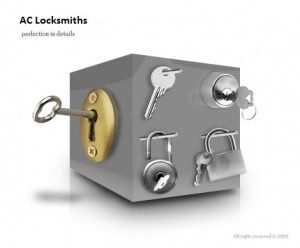
Do you have multi point locks? These are usually on UPVC doors or composite doors where you must lift the handle before locking. Increasingly, they are found on wooden doors as well.
Many of my call outs are to jobs where these have failed and the customer says to me something like; ‘I knew it was getting difficult, but then it just wouldn’t open.’ What happens then is I get the door open and must replace parts of the mechanism or the whole thing, depending on brand. The minimum part cost is £80, but it can go over £200. The sad thing is that in most cases, this cost is avoidable. It might be a case of re-aligning the door, servicing with a good oil or graphite, or clearing wasp cells (wooden doors).
As a rule of thumb your handles should be as easy to lift when the door is shut as they are when the door is closed. You can do the servicing yourself; All you need to do is firstly give the door a good clean all around the edges. Make sure all the holes in the frame are clear of debris, especially if you have a bolt that goes straight down. The holes for the bolt often get stones in which putt excess pressure on the mechanism.
Once everything is nice and clean, look at the front edge and lift the handle up and down a few times to see all the parts that move. You need to lubricate these moving parts twice a year. Best way to remember is do it when you change the clocks. Now push the handle down and hold it. The latch will have retracted and because it is wedge shaped, you will see a gap big enough for your lubricant straw. Push the straw in, squeeze for a few seconds and then work the handles up and down a few times to get the lubricant to all parts inside.
This is especially important if your home is near the sea as sea salt is very harsh. If you own a static caravan and the site management do not service doors for you, you will either need to make time to visit or invest in the services of someone who knows what they are doing.
If your mechanism is still difficult to operate when the door is closed, even after oiling, then you will need to think about door alignment. This is common in conservatories, and anywhere prone to ground movement. Some doors are easy to adjust, some are not, and old doors might need a hinge or two replacing. Look at your hinges. If all looks straight, then small adjustments might be needed. If you can see obvious buckling, then get the hinge sorted by a professional before it breaks the more expensive mechanism.
Even if you are a handy person yourself, finding exactly where the door needs adjusting can be daunting. I came across one I had not seen before in Docking the other day. It took a long time of trial and error to identify the part that was causing the problem. In this case the door itself had warped and while adjustments could be made, the customer had to accept that a part had to be removed completely to avoid having to buy a whole new door.
If after all this, your mechanism is still stiff, then there is something wrong with it. Floppy handles are another good indicator. You now have a choice. Get a professional locksmith in to change the mechanism while the door can be opened and he can get to everything easily or wait for it to go clunk when you have an important appointment and find he has to snap the cylinder, drill the handles or damage the door frame, all of which cost more to replace and fix.
These things happen always at the worst times. I remember at the height of the ambulance delays; an older customer in Holt was locked out because of lock failure. It was icy cold and slippery, as always, I asked if there was external power and so he started towards his garage which he had a key to and slipped over onto his back that had only recently been operated on.
The poor gentleman then had a three hour wait on cold ice while we waited for an ambulance. I couldn’t lift him myself for fear of doing more damage. The lock went at precisely the worst time possible and could have been avoided had the customers addressed the issue sooner. So next time you visit a vulnerable person, please do check their doors for them. Many think the issue is just that they are old.
One of my favourite things is seeing the look on someone’s face when they can suddenly easily use a door they have been struggling with for ages. But don’t call someone like me straight away. Just today, I returned to a lady in Walsingham who was having difficulty with her door that I had adjusted only recently. She showed me what she was doing, and I worked out she was just getting a little muddled with the operation. A quick lesson and write down of instructions and she was good to go again (no charge).
I know budgets are tight for many, but checking your doors now, might just save you a packet in the future – and checking on a vulnerable friend might save them more than just money.
Should you have any questions regarding the above or any other lock issues, please do not hesitate to contact me for a free consultation.
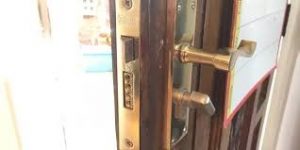
Thumb turn exit – Fire Regulation Locks
Fire Regulation Locks
Last week I quoted a customer for multiple locks within a building of flats in Cromer. I was expecting to wait a while for the confirmation of the job as three of the flats are holiday lets and all four have different owners. In fact, my point of contact phoned to give the job the go ahead very quickly as the neighbouring building had a fire and everyone had to be evacuated for safety. Thankfully, no one was hurt, but guests in the holiday lets did have issues trying to find keys they had placed away from the doors in properties they were not used to.
A thumb turn, keyless escape can be a reduction in security and goes against every bit of best security advice. However, in the event of a fire, your guests are probably going to be sleepy and panicked, the seconds it takes to find the place they have put the keys could be the difference between life and death.
The fire regulations have been in place for a year at time of writing. While a grey area on time was given to get the various jobs done, I doubt any insurance company will pay out after so long should the worst happen. That means those involved in any incidents can chase you, the owner for negligence and your letting agent as well. You could even face criminal charges.
Link to Gov guidance here: https://assets.publishing.service.gov.uk/media/64257cff2fa8480013ec0fec/A_guide_to_making_your_small_paying-guest-accommodation_safe_from_fire.pdf
If you have multiple doors, you might think just the front door and back door are adequate to change, but you must look at every room and think to your self if there were a fire the other side of that room’s inner door, how will someone in a panic get out? If there is a big room with two or more outer doors, will changing one be enough? Is it possible a fire in the middle of that room could cut off access to escape? I know it can be expensive, but nowhere near as expensive as a court battle, even if you win.
If you own a holiday let property or run a property let business, it is now past time for you to have your exit doors converted to fire regulation keyless escape.
Please call me for a no obligation quote.
Lock Picking – the reality

I am an avid reader of Q & A websites. I see lots of questions relating to lock picking and how easy it might be for burglars to pick certain locks. I can say right here, lock picking is not a skill your average burglar possesses. Honestly, I’ve been doing this job for close to 15 years now, and I’m certainly not great at it. Why? Because there are much easier ways to bypass most locks.
Lock picking is a major hobby in some countries and they even have speed picking competitions. They have nice new locks that are well oiled, set up at a comfortable height and they have spent hours every day picking the same locks over and over and over again. What they don’t have is the real world problems of trying to pick locks that are so low, you have to kneel on a wet floor in a howling gale near the sea and the lock is not only rusted, but salt encrusted as well. Strangely, that never happens to the TV hero either who, despite being by-the-book, can suddenly pick any lock in seconds using nothing but a tooth pick or hair pin. Hmmmm.
I was called out to a job in Sheringham the other evening. It was a latch type lock so my first attack was to try and slip the lock. While it would be against common sense to explain how to perform entry methods, I can tell you that in the right circumstances, slipping is a super fast entry method that can take seconds. On this occasion, the door was too tight. This particular door was also devoid of a letter box, meaning I (and potential burglars) could not use a special tool that goes through the letterbox and opens latches easily, again in seconds under the best conditions. At this point, I considered picking the lock. I have picked locks like this in under 20 seconds but I knew this was not going to be on this night. The door being a very tight fit meant the actual latch was pushing hard against the keep in the door frame. Lock picking requires two tools; the pick and a tension tool, which is barely more than an ‘L’ shaped piece of thin metal. It has to be thin, because if it is too thick, it stops the pick doing its’ job. I could pick that lock 50 times and the tension tool would just not be strong enough to rotate the lock.
At this point, as a locksmith, you have to make a decision. Do you persevere possibly for hours, charging the customer a small fortune, or do you break and replace the lock. For this lock, it was a no-brainer. Three of them are equal to my hourly rate, so I went and got my drill. The drill was so fast, neighbours didn’t even bother to come and see what was going on. Had I been a burglar, I would have been in without anyone worrying about the noise made. My customer was happy because after two hours waiting for a locksmith who didn’t show, and then having to wait for me to finish my previous job, getting in quickly and getting a new lock was better than getting in later and being charged more money with no visible gain. I even changed a second lock while I was there.
All the above has a point. Burglars don’t often pick locks. Even easy to pick locks can more effort than they are worth. Burglars snap, slip, drill, smash and use plenty of other methods. But picking is rarely one of the methods they employ; this is why it is important to fit locks that carry the British Standard Kite mark, showing the lock has been tested to attacks that exceed EU regulations. BS3621 locks display the kite mark, showing burglars that they are not going to have an easy time entering your property, no matter what they try.

There is also a second point; please don’t expect your locksmith to have a magic pick that gets you in faster than the TV detective. Locks are designed to be difficult, the better locks get, the harder they are to bypass without damage. When your emergency locksmith reaches for the drill (hopefully they explained why), it’s not because he is unskilled at picking, but more because damage and replace is going to be the best option for you in terms of time and cost. If your lock looks like it will fail in the next twelve months anyway, a new lock now will save money in the near future.
If you have any questions about the above, please contact me through any method on the home page.
Thanks for reading.
Locksmiths Top Tips For Locks and Security

1. Instead of leaving a key in your back door, take a back door key with you when you leave the house. Almost every time I attend an emergency where my customers have lost their keys, they show me the back door with the key in the other side. Carrying a key for the back door in a separate pocket to your front door key gives you a greater chance of being able to get in without waiting for a locksmith. It is also better for security because all the time a key is in your back door, a burglar can break in through a window and easily carry stuff out of your house through that back door!
Leaving keys in doors is good fire safety practice while people are in the property, but they should be removed from locks if the property is empty.
2. Oil your locks regularly – at least twice a year. The best way to remember is to do it every time you change your clocks, w
This is especially important if you live near the sea. Don’t just spray where the key goes in. Most locks have a latch that retracts when you pull the handle down, when the latch retracts, the wedge makes a gap for your oil or silicone spray. Spray for around 5 seconds to get plenty inside, then turn the key a few times to make sure the lubricant reaches all parts. If you have a locking mechanism with lift up handles, works the handles up and down a few times, but make sure you lubricate all moving parts (bolts, hooks, rollers, etc.)
3. Do not put your override keys to your safe inside the safe. Equally, do not leave the override keys anywhere in your property. A burglar can find those keys and get to your valuables. They will know the hiding places you think are sneaky.
Safe keys should be with a trusted friend or family member in an entirely separate property. Also, do not wait for the batteries to get low. Change them annually whether they need it or not. Always consult a security expert before buying a safe because they can advise you on the pitfalls many are trapped by. There is nothing worse than needing your passport from a safe you cannot access and finding out the safe expert cannot get to you for two days by which time, your plane has departed!
4. Please stop posting on social media all about your holiday whilst away. Your friends probably don’t care as much as you would like to think, but the burglar is very thankful you are advertising that your property is empty. Don’t ruin your holiday by coming back to find all your valuables have been taken. You can post your holiday highlights when you get back.
5. When you get extra keys cut, use the originals most. Badly cut keys ruin locks. Key cutters use generic key blanks made from cheaper metals. If you buy your locks from a locksmith, they can order branded keys made for the lock cut from superior metal. These will then be covered by guarantee. Once you use a poorly cut off brand key, and it damages the lock, you invalidate any guarantee given by your locksmith. So if you must get spares made, try to use the originals the most.
6. Be wary if you have a family member who suffers with dementia. This is a sensitive subject but I have experience of a good number of customers coming back to me because they have lost their keys. The excuses are often the same, with angry accusations at neighbours or carers who have ‘let themselves in and stolen my keys again.’ The last thing a locksmith wants is to take advantage of anyone with this awful condition, but we cannot change locks for free. We also cannot ask the customer for phone numbers of family members because it is not right to do so.
If your loved ones are getting forgetful and you notice new locks, firstly try and get a key for yourself. Then, see if you can find out which locksmith they used. I would be more than happy if you called me to say you are MR X’s son/daughter and that if Mr X should call me in a muddle, I should try and call you before setting off to change the lock again. Mr X will be far happier having you search for the key he has hidden and forgotten than me. I would expect any decent locksmith would feel the same.
7. Next to your mobile phone, your lock and keys are the things you use the most almost – every day for that majority of us. Treat them accordingly. When I take handles off of doors, I find a variety of spider carcasses, wasp larvae, rust and other muck. While unscrewing and re-screwing the fixings too many times is not good for the wood, occasional cleans behind the handles is not a bad idea. You might well discover broken springs and other nasties that need seeing to. Better to catch things early before they fail completely and you find yourself unable to get in.
Likewise, I have come across many a door where someone has simply painted over the lock while decorating. It doesn’t take many seconds to undo the screws and remove the lock while painting and even less to put a bit of masking tape over the area. Painting over the lock is not good. At best, the screws fill with paint and when you do need to take the lock out because it has failed, you cannot undo the clogged screws without extra effort. Locks might not be as exciting as a phone, but they are more important.
8. Do not leave keys on a flat surface or hanging up anywhere in the vicinity of a door with a letter plate, especially if you have windows through which the keys can be seen. If I can put a mirror through your letter plate and see your keys, I can retrieve them, which means a burglar can do the same. A letter cage on the back of your door is amazing security, especially if you have a thumb turn rather than key operation on the inside. Better still, seal your letter plate and invest in a separate post box to fit externally.
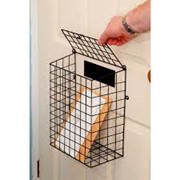

If you have any questions about the above content or any else security related, please feel free to contact me.
See my customer testimonials here
Thanks for reading
Lock changes for landlords
If you own a holiday let property, you should be well aware of the new fire regulations that suddenly hit last summer. I know many of you have been spending all your profits to ensure your properties are up to scratch for the coming season.
But what about long term lets?
The fire risk assessment to be carried out by holiday let owners states; ‘any property you pay to stay in. ‘If that doesn’t already mean long term lets, then it certainly will if the government of the day decides that the measures taking place with holiday lets are a success. After all, the more they make you spend, the more they get in tax.
If you own properties that you let out to tenants, then it might be an idea to get ahead of the curve. Lock changes for landlords; locks are changed all the time through abuse, lost keys, evicted tenants etc. What better time than now to make sure that the new locks going in are keyless escape versions. In the event of a fire, your tenants can get out quickly without having to find keys in a panic situation?
AC Locksmiths Norfolk can change your locks for you. Replacements are kite marked products. All insurances will be valid.

But while thumb turn (escape) locks are great for getting out easily, they can be a reduction in your security. There are tools that can go in through letterboxes and rotate the inner thumb turns, it is important to consider options to cancel this short fall. Letter catching cages are a great remedy to this, or mounting a post box outside your house, while disabling any door positioned letter plates is even better.

Changes are coming. I have spoken to several holiday let owners who have changed locks recently, only to have to change them again in light of the new legislation. It’s worth thinking about being ready for the inevitable.
Any questions regarding the above, please do not hesitate to contact me through any of my contact methods. https://www.ac-locksmiths-norfolk.co.uk/contact-us-here/
Thanks for reading.
A day in the life of your friendly neighbourhood locksmith

Just recently I had a call from a gentleman looking to start up as a locksmith in another county. He wasn’t going to be my competition, so I thought I’d take five minutes to answer his questions and give him some advice. Half an hour later, we were still talking and I had only scratched the surface. Being a locksmith in the UK is hard compared to other places.
From what I read of American locksmiths, their locks are pretty easy to pick but they are pretty standard, so locksmiths tend to re-key locks rather than replace the whole thing. That means they are used to dealing with the same locks day in, day out. Re-keying is where you take out the old pins, put new ones in, using a different configuration and cut keys to match. Across as much of Europe as I have been, the locks are usually euro cylinders, the type we see most commonly in UPVC doors. These are everywhere, and again, pretty easy to get through if you know what you are doing and have the correct tools.
But here is the UK, you never know what sort of lock you are going to find. Nightlatches (Yale locks), mortice (Chubb) locks in 2, 3, 5 or even 7 lever varieties, Rim locks mounted on to one side of the door with a long key, wooden doors, metal doors, composite doors, hollow doors, upvc doors and on and on and on. UPVC doors have in excess of 37 mechanism manufacturers, all whom produce multiple designs with multiple sizes of those designs. To be prepared for any situation, I would need to go to every job in an articulated lorry! If you ever think of going into this business, you must be prepared to learn a lot on the job. Even now, I am coming across things I have never seen before in over 13 years on the job.
So what is my day like? Unlike city locksmiths, being one of the few Norfolk locksmiths, my area is huge. Norfolk has quite a sparse population well spread out and with a notion that we are a ‘safe’ county. That means I can drive for up to an hour to reach my jobs. Admittedly, I do try to keep local, but right now, there is a massive shift in holiday let fire regs and I am racing across the North Norfolk coast fitting thumb turn locks for all those that need keyless escapes. That means from my base, I travel all the way to Hunstanton in one direction and as far as Happisburgh in the other. I will go further, but this is my main focus.
So, Monday means getting to the first job for 9. Mondays are always busy so this will be booked from last week. By the time I finish the first job, I’ve been interrupted by two more bookings and two or more advice calls. With something unexpected happening at the first job (customer not there because they decided to walk the dog and leave me waiting for half an hour, I am already late for the second job. But one of those calls I just received is from someone locked out with desperate need to get back in and pick up the CV they need for their job interview. They are also on a large divert from a direct route to my original second (now third job). With no time to put anything away tidily in my van (my wife never believes that), I hurry to the lock out. Five minutes away, I get the call that the lockout has found a neighbour with a key and they don’t need me. So now I am really late for the second job and have nothing to show for it. Luckily, when I get to the second job, it is really easy for me and I am away in fifteen minutes, catching up time, but not enough to keep my van tidy (honestly, wife!)
The third job is a long distance one, so there and back is nearly three hours. Unfortunately, I need to order parts, so apart from getting them secure, there is not much to do. That’s three (nearly four) visits and only two have resulted in me getting paid today (I don’t usually charge if I can’t do anything). I then come home. I have a backlog of paperwork to do, parts to order and a van tidy to ignore (tomorrow when the weather is better!) During this time, more calls come in and more appointments/queries need to be addressed via email. But Monday is my favourite day. I play football on a Monday night so it is the one time I can switch off. I have been known to go to jobs after playing 5 aside football, but now I ache too much. Any other night I am ready to go when the phone rings. This last week it was Friday and Sunday nights, but luckily on both, I was home by 11pm, so in bed ready for the next day. Tuesday is likely to be more easy jobs like measuring up for thumb turn locks, because I am a wuss with the football (maybe next day for the van tidy!). But the emergencies come in anyway and I can only hope for the long drives in between!
99% of people understand that locksmiths are different to most other traders. We don’t often get big jobs like builders. Most of our time is in between jobs. So when we turn up and get you inside your home in five minutes, the money you pay is for the time to get to you, to return home, the fuel, wear and tear on the van, the time advertising, doing paperwork and eventually tidying the van!
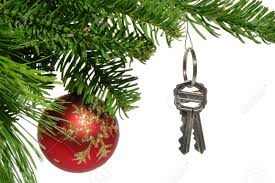
Christmas 2023 AC Locksmiths Norfolk
I am available for emergency work over the Christmas period, working days are as normal between Christmas & New Year.
From myself and my family, I hope you enjoy a happy Christmas and here’s to a happy & healthy 2024.
All the best,
Alan AC Locksmiths
Holiday let owners – are you aware of holiday let and keyless exit point regulations?
In light of the new self assessment fire regulations for owners of holiday lets, here are some things I have noticed people getting wrong:
Firstly, your front door and back door may not be the only fire escapes. If you are in a room with French doors and the fire is the other side of the interior doors, then the French doors are your exit point. Every final exit door is a fire exit and therefore every final exit door must me converted to keyless escape.
Secondly, if you have a porch, the inner door must either be converted as well or left unlockable by the customers. This can be as simple as taking away that key. Alternatively, convert the inner door and remove the key for the outer porch. Either way, the entire route must be keyless escape to meet the keyless exit point regulations.
Finally, this conversion is a serious impact on security. There are tools available that can come in through the letterbox and rotate the thumb turn/push the lever. As these are your holiday lets, I doubt you get much worthwhile mail, so either invest in a letterbox guard, letter collecting basket or seal off the letter box and put a posting box on the wall outside.
So what does the conversion to keyless exit point regulations consist of?
Well, if you have a door with a lift handle mechanism then it simply means changing your double key cylinder for a key and turn cylinder
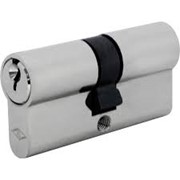
Double key cylinder
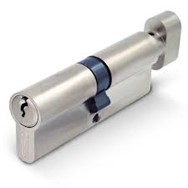
Key & turn cylinder
Prices start from £55, although I see no reason to go for high spec when you are making life easy for the burglar under these new regulations.
If you have a wooden door, you are turning this 
 into this
into this
On wooden doors, you also have the option to install a kite marked nightlatch /Yale type lock
If you need me to come and do a keyless escape conversion for you, please book a free assessment/measure up where I will give you a final no obligation quote and book you for fitting at the next convenient date. Most work can be carried out during changeover days.
Landlord lock law change:
I have just been reading through the Home Office Document: ‘A guide to making your small paying-guest-accommodation safe from fire.’ A guide to compliance with fire safety law for those responsible for safety in small paying-guest-accommodation’
You can find the document here
Note this says fire safety law and therefore is the legal requirement of all landlords, certainly for those with holiday lets. I would argue long term tenants are also paying guests as they have no right to remain when a landlord decides they want their property back for any reason.
Speaking to a letting agency recently, I have also discovered that it will be expected of all landlords to read the document and comply with all points mentioned. You won’t always get a risk assessor to check things for you. You, as the landlord are entirely responsible should a fire break out. It is quite heavy reading and most of it is obvious, but it is my job to point out relevant issues to my own line of work.
In section 6, there is this statement:
‘Exit doors, such as the front or back door, should always be easy to unlock and must not need a key to unlock them from the inside. A simple latch or thumb turn is usually good enough. However, you may need to consider whether all guests are able to open these doors. A simple single action turn handle or lever will often be more appropriate.’
This means you must have a lock with a thumb turn on the inside. Something like this:
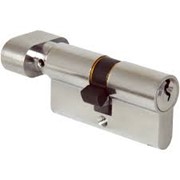
On all upvc type doors, this is simply a matter of changing the cylinder. On doors with mortice (often called ‘Chubb’ type) locks, you will need to change the lock, handles and purchase a cylinder. And while thumb turns are great for fire escapes, they do pose a security risk as it is possible with certain tools to go in through the letterbox and rotate the thumb turn to gain access. Therefore any locks with thumb turns on a door with a letter plate, should also purchase a letter plate guard to alleviate this problem.
The point is repeated on the checklist included in the document: ‘Are frequent checks carried out to ensure exit routes are kept clear and fire exits remain easily openable?’
That is your prompt to make sure no one can lock a door, remove the key and then be unable to get out while panicking in a fire.
October the 1st is the current date for this to become law over advice.
If you have your work done through AC Locksmiths Norfolk, you can expect to pay £55 for a kite marked thumb turn euro cylinder. These can be brass/gold, chrome, polished chrome, dual finish, black or white. An average of £50 to replace your mortice lock with a mortice euro lock case. Handles start at £25 but average at £45. More ornate handles such as wrought iron up to £200. In all cases, a labour fee of £75 is payable. (All prices correct at time of writing, but please get binding quote at measuring stage). In almost all instances, a measuring visit will be required. This is free to all properties within a half hour drive of Holt, Norfolk.
Should you have any questions regarding the above information, please do not hesitate to contact me; 07846643176
Thanks for reading.
It’s that time of year again when the weather starts to do funny things to our doors. I am already being called out to do jobs that could be avoided with some basic maintenance for your locks.
Here on the Norfolk Coast, locks are not only at risk of rusting, but also damage from sea salt and wasps (more on those later).

So what can you do to avoid having to call me, or at least make the call a bit cheaper?
Firstly, keep your door (and window) locks clean. It’s very easy to forget about the front edge of a door when it is shut while you clean, but I see some shocking sights in my work. The more dirt and dust is allowed to build up, the more it finds its way into the working parts of your lock eventually causing damage.
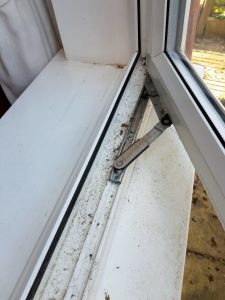
The next step is oiling your locks. There is a lot of argument in the locksmithing world as to whether WD40 or graphite is better. For me, I say WD40 used twice a year (every time you change your locks is an easy way to remember and perfect for changes in weather) works just fine because it coats and flushes at the same time. Oiling does not mean just squirting a bit of oil where you put your key in the lock. If you have a wooden door with a mortice (“Chubb” type) lock, then the part inside stops the oil getting to where is needed and if you have a lock with a “Yale” type key, then oil in the key way is only getting a tiny percentage of what needs to be oiled. If you have any lock with a latch, either pull the handle down or rotate any lever knob to retract that latch. If you look where the latch retracts, you will see that the wedge shape of the latch will create a perfect gap for you to put in the straw provided with cans of WD40. Squirt for about 5 seconds (10 seconds if first time) and then work the handles, etc a few times to get the oil all over the insides.
On doors with multipoint locking systems (eg UPVC doors) you should also look at the front edge and lift the handles up and down a few times. Give another squirt of oil to anything you see moving. When you do this, you might even find the sticker that tells you to oil the door that you never knew was there and the installer never told you about! If you have a wooden door with a single deadlock, unscrew the faceplate at the front and take it off. This will now give you a larger gap around bolt. You might have to hold the WD40 straw in one corner, but squirt what you can, being aware you might get some splash back at you and oil does not clean up from clothes easily, so no maintenance in your wedding dress/designer suits. Don’t forget to put the face plate back on afterwards. In all cases, put some rags on the floor as oil will run down and drip off the bottom of the door and WD40 even stains paving stones.
Once you have done all the above, keep an eye on how difficult your door is to open. Hotter summers are warping even doors that never recognisably warped before. If your door is becoming difficult to operate in any way, there will be undue stress on various parts of your lock which will eventually lead to something breaking. The most common problem last year was French doors shrinking away from each other and the hooks of the multipont mechanisms not being able to get into their slots. Multipoint mechanism doors are usually adjustable, if your door is not as easy to operate when closed as it is open, best get the door adjusted before something breaks and you will have to add a locking product on to the cost of the adjustment.
Finally, those pesky wasps. If you have a wooden door with a multipoint locking system (lift the handles to lock) and it does not have top and bottom bolts, there will be a gap at the top behind the metal faceplate. This gap runs down behind the faceplate as far as the first moving part you can see. It is the perfect size for wasps to make cells in which to grow more baby wasps. Those cells harden a lot and can cause the mechanism to break. My advice is to at least put insect repellent all over the top of the door and then maybe stick a small cotton wool ball just in the top to bar access. I’ve dealt with a few of these cases now, and I really don’t like angry wasps trying to get me while I destroy their hard work!

If you have any questions regarding the above information, please don’t hesitate to get in touch by phone, text or email.
Thanks for reading.
















